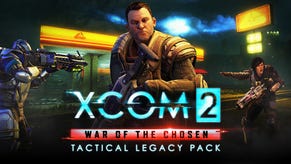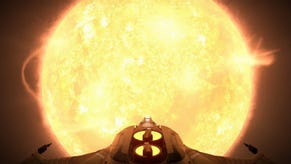XCOM 2 PC Review: Liberty or Death
Firaxis spreads their wings and takes some risks with their sequel to XCOM: Enemy Unknown.
This article first appeared on USgamer, a partner publication of VG247. Some content, such as this article, has been migrated to VG247 for posterity after USgamer's closure - but it has not been edited or further vetted by the VG247 team.
My single favorite moment in XCOM 2 is when I spring a trap out of concealment against a group of unsuspecting aliens. All it takes is a single grenade, and all of the sudden the field will be alive with gunfire and alien screams as my squad stands and bloodlessly cuts them down. A perfectly executed ambush in XCOM 2 is truly a thing of beauty.
Concealment, a new mechanic that allows you to move stealthily around the battlefield until you're spotted, is one of several interesting improvements in XCOM 2 - the sequel to 2012's XCOM: Enemy Unknown. After the positive reception afforded Enemy Unknown, Firaxis clearly feels more confident in taking risks with the form and structure of the tactics series. Perhaps the most important change is that you now control an underground rebellion, forcing you to be more proactive than reactive. Rather than simply waiting for the aliens to make their next move, you have to take the fight to them.
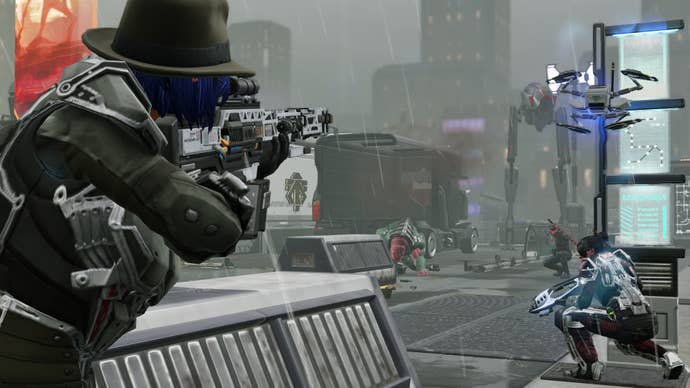
XCOM 2 posits a scenario in which humanity actually failed to stop the initial invasion depicted in Enemy Unknown. Subsequently forced underground, the remains of XCOM can only watch as the aliens come into the open and begin to build a new society. On the surface, it looks as if the aliens are introducing radical new technological innovations and wiping out crime. But, of course, these improvements have a malevolent purpose to them, as you discover soon enough.
As with the other games in the series, XCOM 2 is divided between a strategy section and a tactics section. In the strategy portion, you fly around the world in a captured alien freighter fighting the alien occupation forces, making contact with worldwide resistance cells, and trying to discover the purpose behind the Avatar Project - an implacable countdown to destruction that serves as the alien's endgame. On the ground, XCOM 2 is a turn-based tactics game with several distinct classes, all of whom level up and gain new abilities as they earn experience in the field. In the course of XCOM 2, you will have to thwart alien terror attacks and strike at their secret facilities, all while constantly researching new technology and developing new weapons. The story is advanced through secondary objectives like using a Skulljack to hack into the alien network via an enemy's brain, or raiding particularly sensitive facilities.
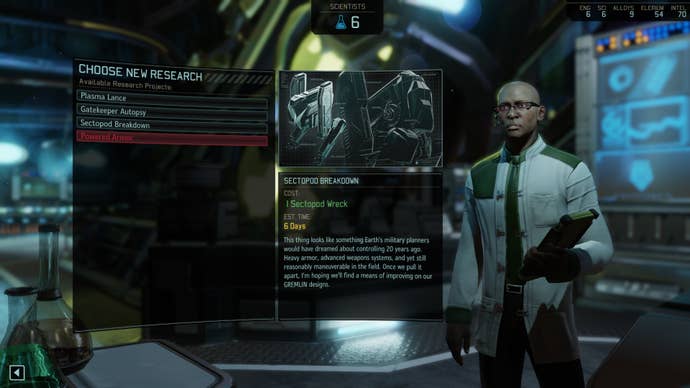
The Avatar Project serves as XCOM's central mystery, as well as its central source of tension. As the story progresses, you learn more and more about what the aliens are attempting to accomplish - a slow drip of information that proves riveting. In the meantime, the Avatar Project's bar to completion is slowly ticking upward, with a full bar resulting in a win for the aliens. Often, you will have to divert from whatever you're working on to take out an enemy facility, or else you run the risk of letting the bar get too high. The Avatar Project is a time bomb that adds pressure to every decision.
Additions like these help to elevate XCOM 2's strategic layer and bring it more in line with the excellent tactical segment. The Avatar Project makes XCOM 2 feel like a tug of war as each side struggles for advantage. You take out a facility, and they launch a retaliatory attack on one of your resistance cells. You move to grab precious Supplies - one of the game's two currencies alongside Intel - and you run the risk of getting attacked by a UFO and forced to defend your ship. You will have to make a lot of interesting decisions, such as choosing whether to spend your supplies and intel on research, or to contact a new resistance cell and open up a new area of the map. And the aliens, too, will occasionally force your hand and make you choose, for instance, whether you'd rather deal with a UFO hunter or additional reinforcements for each mission.
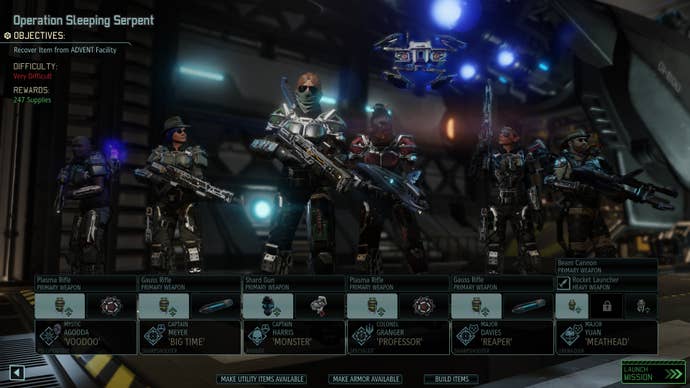
Decisions like these are the lifeblood of any good strategy game, and it's good to see them gain more prominence in XCOM 2. They add tension, particularly in instances where your squad is wounded, the Avatar Project gauge is high, and there are multiple UFOs out for blood. No matter what you choose, you know there will be consequences down the line.
It should go without saying that XCOM 2 can be quite difficult at times, even on the average difficulty level. At one point, I found myself stuck in a mission with enemies I simply wasn't prepared to handle, and it was only with luck, good planning and lots of save reloads that I got through with the majority of my squad intact (though I lost my Grenadier to poison - rest in piece Katsume 'Diesel' Watanabe). There are also the frustrating times when your team members will whiff on an alien that they have a 90 percent chance to hit, consequently leaving them open to unnecessary damage or even death.
And yet, XCOM 2 is also in some ways more forgiving than its predecessor. For instance, it's possible to earn high-level soldiers as a reward for completing certain missions, thus bolstering your squad and taking away some of the sting of losing a valuable soldier. Ironman - a mode in which manual saves are disabled and death is truly permanent - feels much more viable this time around.
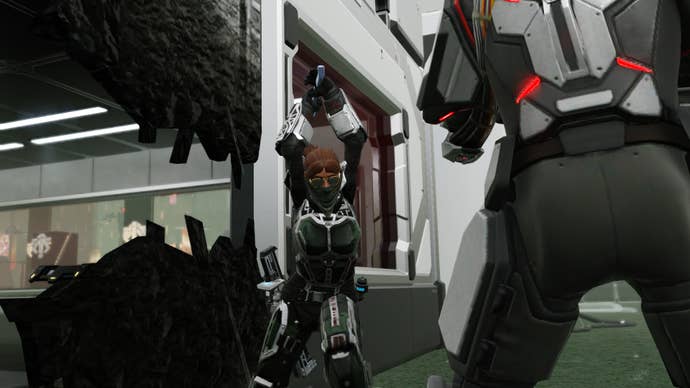
In this way, XCOM 2 feels like a smart evolution of Firaxis's first effort, which was also excellent. The new setting and mechanics make it feel like much more than a mere retread, as does the rather large roster of new and improved aliens. If you've played the previous games, half the fun of XCOM 2 is seeing how the old aliens have grown and changed, and what new additions have been made to the roster. In case you needed anymore reason to hate and fear Chryssalids, they can now burrow and move underground, which is just wonderful. Conversely, XCOM's Ranger class - an update on the original Assault class - now wields an energy sword; and at high enough levels, they are an absolute buzzsaw. All of the classes have been updated in one way or another, and they bring with them new tech trees as well - another way in which XCOM 2 manages to avoid feeling stale.
At this point, my only real gripe concerning XCOM 2 is that it's been really unstable on my system. It's crashed pretty much like clockwork whenver I've played it, and there's been occasional graphical corruption as well. I can only conclude that it doesn't play well with my AMD R9 200 series graphics card, which has become an unfortunate trend in an Nvidia dominated marketplace. I've tried all of the usual fixes; but so far, no dice. I suppose that I'll have to hope that a patch will fix it, or that it was a problem of playing in "Fullscreen" instead of in "Windowless border" mode.
Having said that, I'm actually pretty close to finishing up XCOM 2. I unlocked the final mission last night, and I'm in the process of researching the last technological upgrades so I can have a full-equipped party. All that's really left for me is to wrap up the game and maybe play some multiplayer. I'll have a final score for you a little later this week. Until then, I feel pretty comfortable endorsing XCOM 2, crashes aside. This sequel is exactly what I was hoping for when Firaxis took over the series close to four years ago.
InterfaceThere are relatively few changes from the original game in terms of the interface. The point-and-click interface and the menus are intuitive as ever, with plenty of signposting for new players.
Lasting AppealWith all of the mods and the inherent challenge of Ironman mode, I suspect a lot of people will be playing XCOM 2 for years to come.
SoundThe soundtrack is eerie and subdued, heightening the tension as you move across the battlefield. All of the aliens have their own distinct sounds, and you'll come to know them well as the game progresses. In short, it does everything that good game audio should.
VisualsOn its highest settings, XCOM 2 looks terrific. Aliens and soldiers alike are extremely detailed, and the destructible environments result in a dynamic and fun battlefield. It's quite a step up from the original game.
ConclusionXCOM 2 updates the franchise's formula without sacrificing what works in the original game. You have more freedom than before, and relatively superfluous elements like the Interceptors have been cut. More importantly, the pacing and structure really does make you really do feel like a band of renegades taking on an occupying force. It's been a fun ride, and with more mods on the way, I'm looking forward to playing it again - the best possible compliment I can pay to a tactics game.
Alright, with XCOM 2 now done and dusted, it's time for a final score. Overally, my opinion hasn't changed too much from my initial thoughts - it's still a thoughtful evolution of what was already a fantastic tactics game. I will say, however, that I thought that the final mission was a tad limp. Don't get me wrong, it was quite tough; but when it was finished, I audibly said, "Oh, that's it?" It actually felt like one of those old DOOM mods where someone would try and see how many monsters they could fit on screen at once.
Anyway, I'm generally satisfied with the outcome, but I'm also kind of exhausted. I put about 40 hours into XCOM 2's campaign, and as much as I enjoyed it, I'm ready to play something else. I may come back and play the main campaign on a higher difficulty level (or Ironman mode!); but then again, the normal difficulty was pretty hard on its own. I don't even want to think about what some of the endgame enemies will be like on the highest difficulty level. Of course, there are always mods, right?
Anyway, I don't normally do this for a review; but I thought reader pdubb had some pertinent questions in the comments, so I'll do my best to answer them in turn:
1. Are all classes viable, or are there any that blatantly feel less useful, like the support class in the original game?
I think the classes are all pretty useful by the endgame. In the early going, the Ranger and Grenadier were definitely less useful than the Specialist and Sharpshooter; but by the end, my Ranger was one of my deadliest characters, using her melee attacks to do massive amounts of damage without fear of retaliation. As for the Specialist, they have the massively useful ability to hack robot enemies and either shut them down or turn them against their former masters. I leaned on that ability quite heavily through the midgame. By the end, my Sharpshooters, my Ranger, and my Psi Ops soldier dominated pretty much everything, with the Grenadier and Specialist there for backup. But taken together, I think all of the classes have a valid niche on the battlefield. Let me tell you - the Specialist's remote healing ability will save you on Ironman mode.
2. How do the different enemies feel? Does it become a slog at the end game where the challenge is taking down bullet sponge enemies like Sectopods, or does the game still mantain a fast pace?
Around the midgame, the enemy units suddenly made a leap and left me behind, forcing me to scramble to catch up. In those missions, it was a bit of a slog. Once I managed to research the next round of upgrades, though, the game picked up the pace again. Actually, I was a tiny bit sad that the aliens didn't get a third and final round of upgrades for the endgame. By the midgame, I had seen close to everything the aliens had to offer (but not everything!), and I could deal with them relatively easily in turn as long as they didn't get the drop on me. The Sectopod and the Gatekeeper can take a lot of bullets, but that's where secondary abilities like hacking come in, as well as specialized ammo. If you're properly prepared, then most encounters will move at a good clip.
3. And lastly, in order to really play and beat the higher level difficulties, you needed to abuse overwatch traps and a slow and steady pace. Thematically in the first game this made sense as you had no idea what to expect. Does XCOM 2 play like the theme of it suggests, extremely fast and brutal operations that become extremely dangerous if allowed to escalate?
From a tactics standpoint, abusing overwatch traps is still the way to go, especially with characters having the advantage of stealth early on. If you move too quickly, you will inevitably wind up with one character isolated and flanked by a slew of enemies, so it behooves you to move at a slow and steady pace. In the final mission, I basically sat down at a chokepoint and used mind controlled minions to draw out enemies piecemeal so I could kill them from a distance. With that said, the aliens will periodically send in reinforcements, so you can't dawdle too much. My favorite missions were the ones where it felt like I was completing my objective and escaping just before the enemy forces came crashing down on me.
Ultimately, I thoroughly enjoyed my time with XCOM 2. It addressed many of my issues with the original game, and it threw enough curveballs at me that I was consistently on my toes. Plus, it has a pretty solid central mystery, which is made all the better if you know how the original game ended. Having now played the final build, I can even report that the crashing has subsided. I managed to make it through the final couple missions without a single crash back to the desktop. On that note, though, it's a surprisingly resource intensive game, particularly in the final mission. If you have a mid-tier system, you may find yourself stuck on the lowest setting.
This, of course, is not the end for XCOM 2 - not by a long shot. 2K Games has already a "Reinforcement Pack" due for launch in summer 2016, which will contain a new soldier class, more missions, and more items. It will also have three mods available out of the box courtesy of Long War Studios - creators of Enemy Unknown's best mod. With a robust set of tools available from the start, XCOM 2 should see even more post-launch community support than the original game.
Firaxis has ultimately checked the right boxes with their sequel, and they've demonstrated a stronger grasp of what made the original game so great. And fortunately, this appears to be just the beginning for what should be a long and healthy run for XCOM 2.
InterfaceThere are relatively few changes from the original game in terms of the interface. The point-and-click interface and the menus are intuitive as ever, with plenty of signposting for new players.
Lasting AppealWith all of the mods and the inherent challenge of Ironman mode, I suspect a lot of people will be playing XCOM 2 for years to come.
SoundThe soundtrack is eerie and subdued, heightening the tension as you move across the battlefield. All of the aliens have their own distinct sounds, and you'll come to know them well as the game progresses. In short, it does everything that good game audio should.
VisualsOn its highest settings, XCOM 2 looks terrific. Aliens and soldiers alike are extremely detailed, and the destructible environments result in a dynamic and fun battlefield. It's quite a step up from the original game.
ConclusionXCOM 2 updates the franchise's formula without sacrificing what works in the original game. You have more freedom than before, and relatively superfluous elements like the Interceptors have been cut. More importantly, the pacing and structure really does make you really do feel like a band of renegades taking on an occupying force. It's been a fun ride, and with more mods on the way, I'm looking forward to playing it again - the best possible compliment I can pay to a tactics game.







